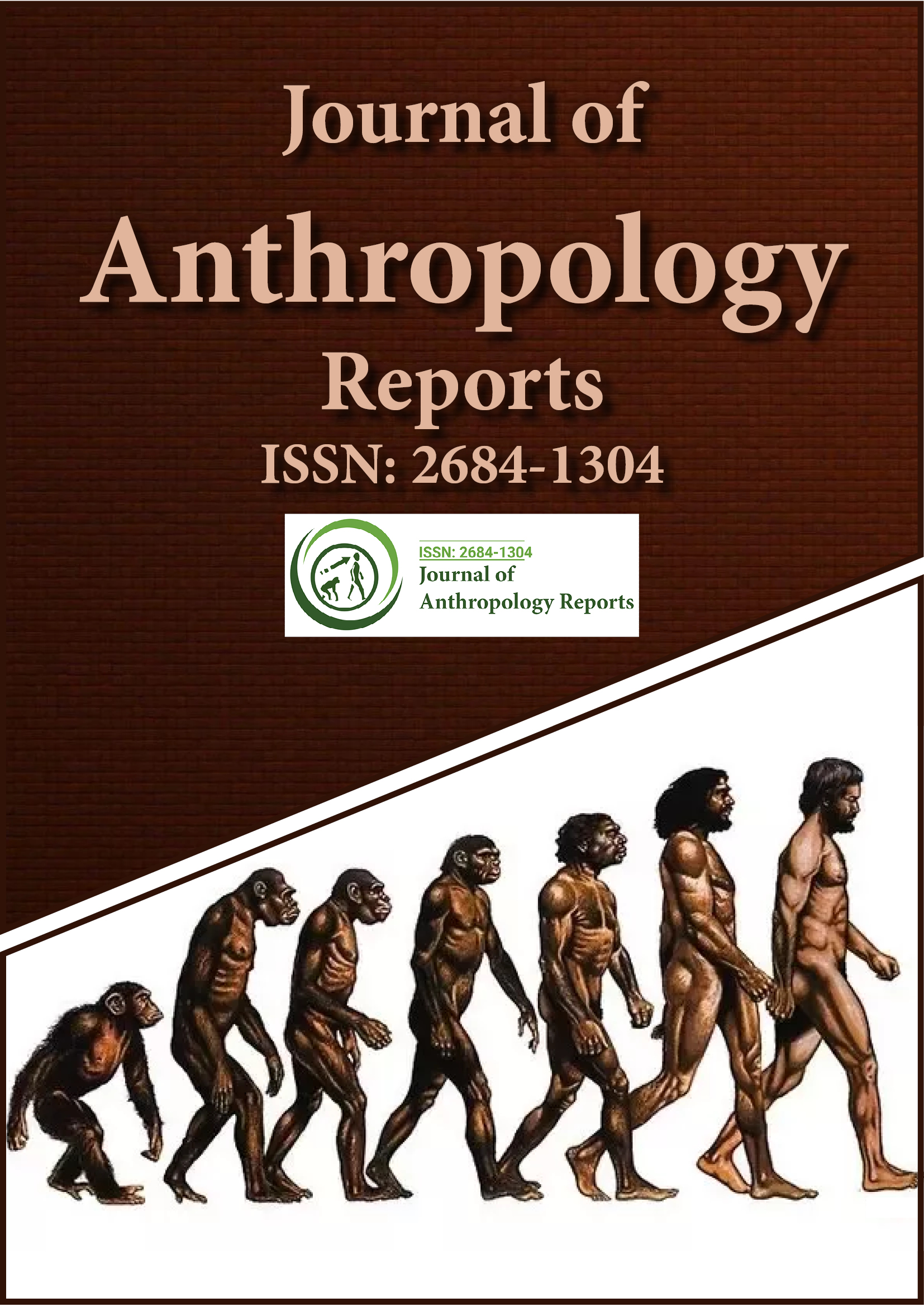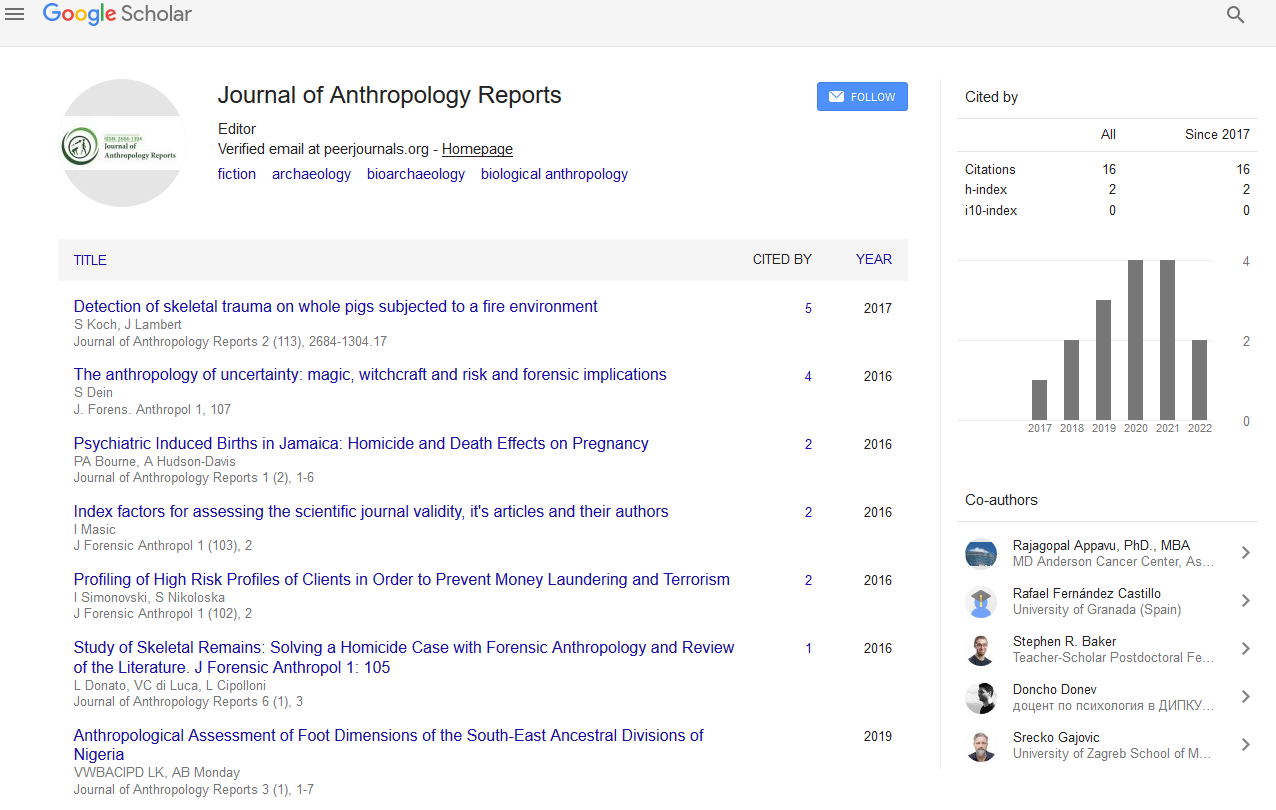Indexed In
- RefSeek
- Hamdard University
- EBSCO A-Z
Useful Links
Share This Page
Journal Flyer

Open Access Journals
- Agri and Aquaculture
- Biochemistry
- Bioinformatics & Systems Biology
- Business & Management
- Chemistry
- Clinical Sciences
- Engineering
- Food & Nutrition
- General Science
- Genetics & Molecular Biology
- Immunology & Microbiology
- Medical Sciences
- Neuroscience & Psychology
- Nursing & Health Care
- Pharmaceutical Sciences
Commentary - (2023) Volume 6, Issue 4
The Significance of Forensic Anthropology in Solving Homicides
Fernandez Jofre*Received: 28-Nov-2023, Manuscript No. JFA-23-23413; Editor assigned: 30-Nov-2023, Pre QC No. JFA-23-23413 (PQ); Reviewed: 07-Dec-2023, QC No. JFA-23-23413 (QC); Revised: 21-Dec-2023, Manuscript No. JFA-23-23413 (R); Published: 28-Dec-2023, DOI: 10.35248/2684-1304.23.6.176
Description
Forensic anthropology and archaeology, multifaceted disciplines at the intersection of science and history, serve as important tools in uncovering the secrets of our past and solving contemporary mysteries. In this article, we will explore the significance of forensic anthropology and archaeology and how they contribute to understanding our past and present of unexplainable forensic anthropology and archaeology.
Forensic anthropology: Unearthing clues from bones
Forensic anthropology is the scientific study of human remains to establish the identity of individuals and determine the circumstances of their death. This field associates between biology, anthropology, and criminal justice, playing a pivotal role in solving crimes and identifying missing persons.
One of the most vital aspects of forensic anthropology is the ability to determine an individual's age, ancestry, and stature from skeletal remains. These details can be essential in homicide investigations, helping law enforcement narrow down their search for potential suspects. Moreover, forensic anthropologists can analyse the bone injuries to discern whether they resulted from accidents, homicides, or other causes.
In cases of mass disasters or missing persons, forensic anthropologists can help bring closure to families by identifying the deceased through skeletal analysis. Where forensic anthropologists played a pivotal role in identifying victims.
Archaeology
Archaeology, on the other hand, drives through time, unearthing the remnants of ancient civilizations and allowing us to piece together the puzzle of human history. This field of study is not limited to discovering treasures buried in the earth; it also provides insights into how our ancestors lived, what they believed, and how they interacted with their environment.
Archaeological excavations have revealed the greatness of ancient empires like Egypt, the mysteries of lost cities like Pompeii, and the rich cultural heritage of indigenous peoples worldwide. These discoveries deepen our understanding of human society, technology, art, and spirituality throughout the ages.
Moreover, archaeology helps us learn from the past. By studying ancient civilizations and their successes and failures, we gain valuable knowledge that can inform contemporary challenges, such as climate change and sustainability. For instance, examining how past societies managed their resources can provide essential lessons for our own sustainable development.
The symbiosis of forensic anthropology and archaeology
Forensic anthropology and archaeology often intersect, especially in cases where human remains are found in archaeological contexts. Archaeological sites can contain hidden graves or mass burials that hold clues to ancient crimes, warfare, or epidemics. In such cases, forensic anthropologists collaborate with archaeologists to unearth evidence that can focus on historical events while bringing justice to the victims.
Additionally, forensic anthropology can help archaeologists analyze ancient remains to uncover aspects of past societies, such as burial practices, dietary habits, and health conditions. These insights enrich our understanding of human history and how societies evolved over time.
Conclusion
Forensic anthropology and archaeology are not just academic pursuits; they are vital disciplines with real-world applications. Forensic anthropology helps solve crimes, identify the missing, and bring closure to grieving families. Archaeology enriches our understanding of human history, informs our present challenges, and preserves our cultural heritage. These disciplines serve as a main reminder that our history is not a remote region but an integral part of human life. By delving into the unsolved cases of the past, forensic anthropology and archaeology illuminate the path ahead, helping us make informed decisions, solve modern problems, and celebrate the rich tapestry of human history.
Citation: Jofre F (2023) The Significance of Forensic Anthropology in Solving Homicides. J Anthropol Rep. 6:176.
Copyright: © 2023 Jofre F. This is an open-access article distributed under the terms of the Creative Commons Attribution License, which permits unrestricted use, distribution, and reproduction in any medium, provided the original author and source are credited.

